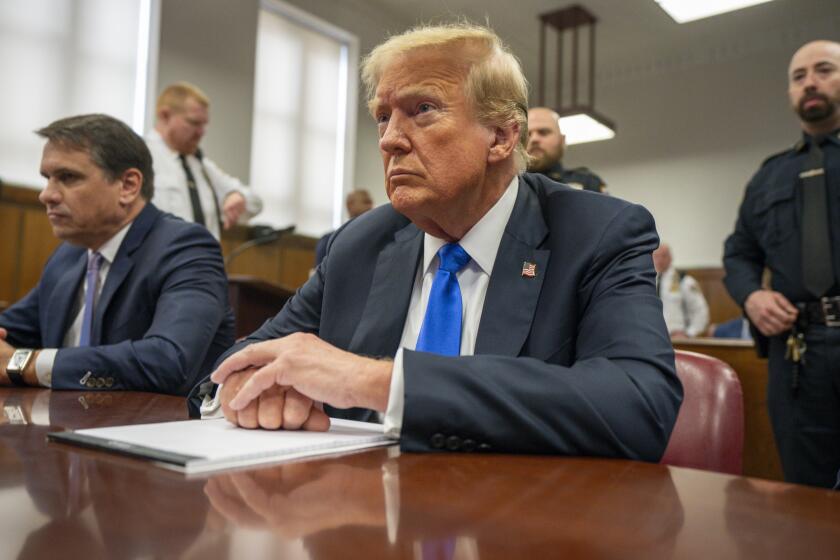Op-Ed: Why voters shouldn’t be electing judges
Do you know which judicial candidates you are voting for in the next election? Neither do I. And I teach election law.
It matters who serves as judges. They preside over state civil and criminal cases. Whether it is a murder trial or a divorce case, judges make hundreds of important decisions each day.
In June, there are 26 candidates running for 12 contested judicial seats (and three running unopposed in open seats) in Los Angeles County. So how do I decide whom to vote for?
I do my research. I read the candidate statements in the voter guide. But that gets me only so far. Candidates only get to use three words for their job title.
I look at the Los Angeles County Bar Assn.’s judicial evaluations page, which rates candidates as “exceptionally well qualified,” “well qualified,” “qualified” and “not qualified.” This can be a handy resource, but it isn’t particularly helpful when all candidates in a race have the same rating, which happened in five of the 12 contested races this cycle. The group does not give reasons why candidates receive a certain rating.
I also look to newspaper endorsements and information provided by nonprofit groups such as the League of Women Voters.
But I still wonder whether I’m sufficiently informed. And how many of us are willing to do even that much research?
What happens when voters lack meaningful information about candidates? We tend to vote based on factors that have little or no bearing on a candidate’s qualifications. For example, there have been instances of qualified sitting judges with foreign-sounding last names being defeated by less-qualified or unqualified challengers with Anglo-Saxon-sounding names. Of course no one can definitively say that’s why those candidates lost, but that’s the inference.
There is more than just an informational problem here. It is inherently knotty to ask judges and would-be judges to take part in political campaigns. Judges should be making decisions by applying the law to the facts. Sometimes these decisions will be unpopular. That is often as it should be. Judges apply many laws meant to protect the rights of the minority, not the majority. Judges should not have to consider how their decisions would play in the next election — with voters or potential donors.
And speaking of donors, who is likely to make campaign contributions in judicial elections? Typically, lawyers — people who know the candidates and may appear before that judge. It is problematic for judicial candidates to ask for and receive money from those who may have cases before them in the future. A 2013 report by the Brennan Center, the National Institute on Money in State Politics and Justice at Stake detailed the pitfalls of such a system.
Some may say that this system is similar to the one for political candidates, but it is not. Members of the legislative and executive branches rarely make decisions on their own. They must convince colleagues. Judges must convince only themselves.
We do not hold judicial elections at the federal level. Instead, the president appoints and the Senate confirms federal trial and appellate judges.
For state judges in California, we have a hybrid system. The governor has the power to appoint judges to fill vacant seats, but we hold elections as well. Most trial court judges first obtain their positions via the appointment process, and incumbent judges generally are not challenged. In the June elections, 150 of 151 incumbent judges in L.A. County are running unopposed. Does this undercut some of the problems related to judicial elections? Sure. But throughout a judge’s term, there remains the possibility that he or she will be challenged.
In California, Supreme Court judges and appellate judges are appointed by the governor and must be confirmed by the Commission on Judicial Appointments. This panel is composed of the attorney general, the chief justice and a senior presiding justice of the state Court of Appeal.
Appellate judges must be approved by the voters at the next general election after their appointment, and stand for retention elections at the end of their terms. These are uncontested elections in which the voters decide only whether a judge gets to remain in his or her seat. Appellate judges serve 12-year terms (unless they are serving out the remainder of a vacated term).
Trial court judges serve six-year terms. For these positions, any attorney who meets the constitutional requirements can file to run for an open seat or to contest a sitting judge.
For decades, the Legislature has also required that the governor request an investigation of all potential appointees by the State Bar’s Commission on Judicial Nominees Evaluation. The commission’s recommendations are nonbinding but persuasive.
Hence, we already have a strong model for the type of system we should adopt for all state judges. But instead of standing for retention elections in the case of appellate judges, or regular elections in the case of trial court judges, all judgeships could originally be filled by gubernatorial appointment, followed by potential reappointment by the governor, with approval by the Commission on Judicial Appointments.
Given the typical voter’s lack of information and the innate problems with judicial elections, we should move to a model that eliminates judicial elections. This is not a reflection on the qualifications of those running for a seat on the bench. Many of the candidates may turn out to be wonderful judges. But voters should not be the ones making that decision. I cast my ballot against judicial elections.
Jessica A. Levinson, an associate clinical professor at Loyola Law School-Los Angeles, is the vice president of the Los Angeles Ethics Commission. She blogs at PoLawTics.lls.edu. Twitter: @LevinsonJessica.
More to Read
A cure for the common opinion
Get thought-provoking perspectives with our weekly newsletter.
You may occasionally receive promotional content from the Los Angeles Times.










